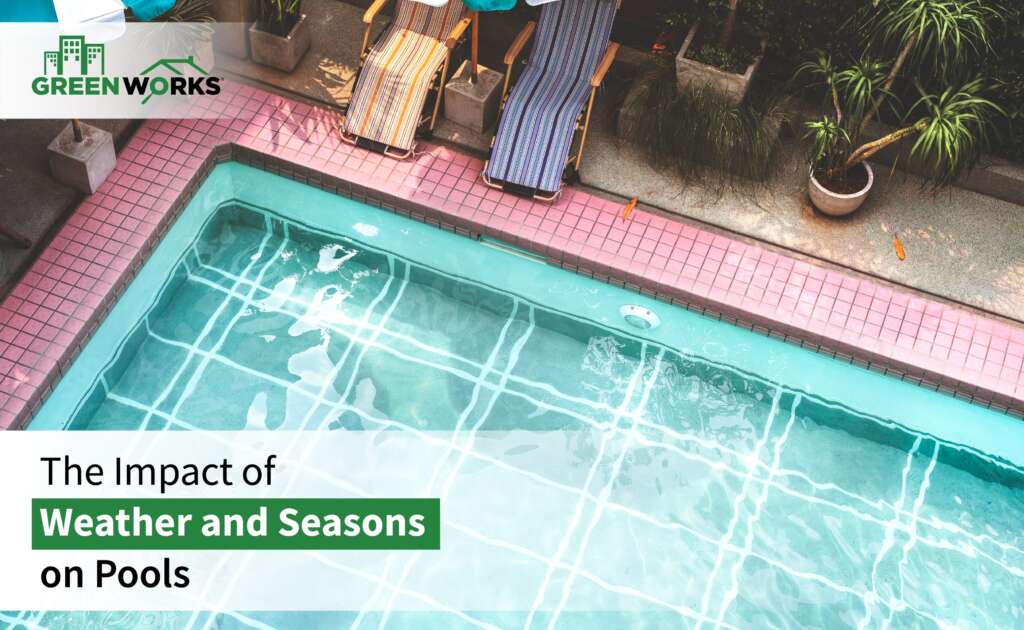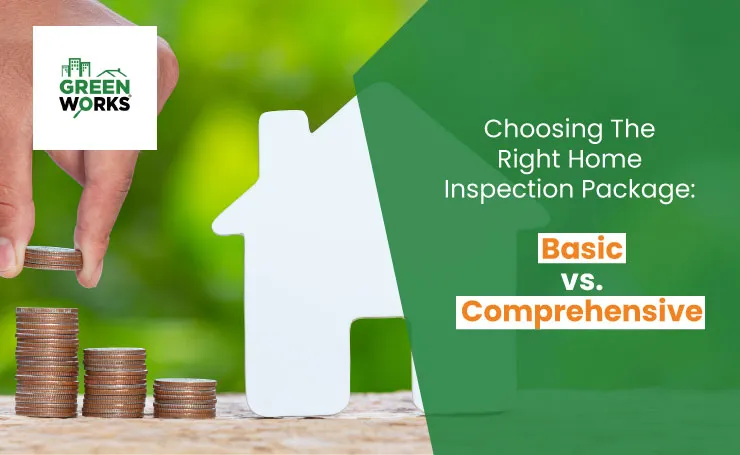Posts

The Impact of Weather and Seasons on Pools
Swimming pools are a source of fun and joy for families. But cleaning and maintaining it is far beyond just balancing its chlorine levels or skimming leaves over the water’s surface. Your pool needs different care and attention in different weather conditions. It is due to varying weather’s effects on pool conditions. GreenWorks is here to guide you on this matter.
In this blog, we will be discussing how weather affects your pool. For this purpose, we’ll check how different climates like summers, humidity, winters, or rainfall cause problems in the pool.
How Weather Affects Your Pool
Your home’s pool can be subject to several issues that you might overlook at first glance. It may include algae or fungus growth at the pool surface, leaks, clogged filters, liner damage, cracks, structural damage, scaling, and staining. These issues may be due to extreme climate conditions.
Different weather conditions have various impacts on your pool. Extreme weather can badly influence the pool’s structure and even compromise your family’s safety. Let’s go through how weather affects your pool.
Sunshine
No doubt that sunshine invites you to a refreshing dip into the pool to take away all your mind burdens. But if your pool is exposed to sunbeams for a longer time, it can harm your pool. The UV rays of the sun can directly reach chlorine molecules, due to which your pool becomes more susceptible to bacteria or germs. Not only that but the pool liners and structures also start fading due to constant sunlight exposure. Let’s discuss more cons of sunlight on the pool’s integrity.
Fading and Damage
The pool surfaces can fade or get damaged when it’s exposed to sunlight for a longer time. If the pool is made of certain materials like vinyl or fiberglass, then it’s sure to be subject to fading and damage risks. It happens due to UV rays, which break down the molecular structure of pool surface material. This leads to discoloration, dropping its structural integrity.
Loss Of Chlorine Effectiveness
Chlorine is an important disinfectant to cleanse the pool water. The sunlight can break down chlorine molecules in the pool water and release harmful bacteria. As a result, you will notice reduced effectiveness of chlorine in cleaning the water. This can also imbalance the water chemistry and make a favorable environment for algae or other contaminants to grow.
Water Discomfort
When water is hot from sunlight, it will not please a swimmer to swim. Instead, it can be uncomfortable for them during the peak of summer. This can deter people from using the pool and reduce their enjoyment.
Rainfall
Rainfall may seem harmless, but it can bring various red flags for your pool’s intactness. Rainwater brings impurities to pool water, upsetting its chemical balance. When rainfall is excessive, it can overflow the pool and cause erosion and damage to the surrounding area.
In case the rain is acidic, the pool water becomes more uncomfortable and riskier for the swimmers. It can even cause health problems like skin rashes or irritation. Here are some damages you can expect from rainfall on the pool condition and structure:
Erosion and Runoff
Heavy rainfall causes erosion in the soil surrounding the pool. This can lead to the pooling of water around the pool area. That’s not all. You will also notice a runoff carrying debris, dirt, and chemicals into the pool. This will contaminate the pool water, causing extra cleaning efforts.
Dilution of Pool Chemicals
Rainwater dilutes the pool water and reduces the concentration of chemicals in it. This can make pool sanitization ineffective. And it also creates friendly living conditions for algae and bacteria. This is where a thorough pool inspection helps you. The inspector will check the chemical levels and advise you on its adjustment after heavy rainfall.
Increased Maintenance Needs
Hefty rainfall brings twigs, debris, and leaves into the pool. And you will need to spend more time and effort to clean and maintain the pool after a downpour. This is an actual workload to remove impurities from the pool and its filter media.
Humidity
High humidity provides an ideal environment for algae and mold growth. Algae makes pool surfaces slippery and creates an unhygienic swimming environment. Besides that, it can also cause moisture damage, affecting your pool equipment’s efficiency. This will also lead them to increase wear and tear. Let’s see some negative effects on the pool caused by humidity.
Corrosion of Metal Parts
Humid air contains more moisture, which can come in contact with the metal components in and around the pool. These metal components may include railings, ladders, and other metallic fixtures. Corrosion can weaken these components and compromise their structural integrity.
Weakening of Structural Integrity
When the pool is constantly exposed to high humidity, it will weaken the structural integrity of the pool. The concrete surfaces of the pool might erode. And the grout (spacing between tiles) can get damaged and moisture-intruded faster. This will lead to potential leaks or cracks in the pool structure.
Efficiency Issues with Pool Equipment
Pool equipment, including pumps, motors, and heaters, can affect the high humidity adversely. Moisture seeps into the electrical components of pool devices. This leads to malfunctioning and poor efficiency of the equipment. Through regular pool inspections, you can keep a check on the humid conditions of the pool.
Cold Weather
If you live in an area where temperatures greatly drop, it can wreak havoc on your pool. Cold weather causes pool water to freeze, with potential risks of bursting pipes or damaging pool structures. Let’s explore some adverse effects of winters on your pool:
Ice Formation
The formation of ice on the pool’s surface can damage its surface. Materials like tiles are more delicate and are prone to damage in cold weather. When ice expands, it pushes against the pool walls and creates stress points. This leads to potential cracks and fractures in the pool.
Winterization Challenges
Proper winterization, preparing the pool for winter, is vital. Or else it could be subject to damage. The water left in pipes or pool equipment could be frozen. This may crack the water pipes. The pools with improper winterization are more susceptible to winter damage.
Damaged Equipment
If water inside the pool equipment freezes, it can be badly damaged. This equipment includes pumps, filters, heaters, and more. Ice expansion can crack pipes and other components, rendering them ineffective. It will cost you hefty repairs or replacements.
The Bottom Line
Regardless of the season, weather conditions can significantly impact your pool. Regular pool inspections are your best defense against weather-related damage. They detect problems early and provide valuable guidance on how weather affects your pool.
We highly recommend scheduling regular pool inspections, especially before and after extreme weather events. This proactive approach ensures your pool remains in top condition so you can have a safe and enjoyable experience for you and your family. Explore more of our blogs to learn more.



